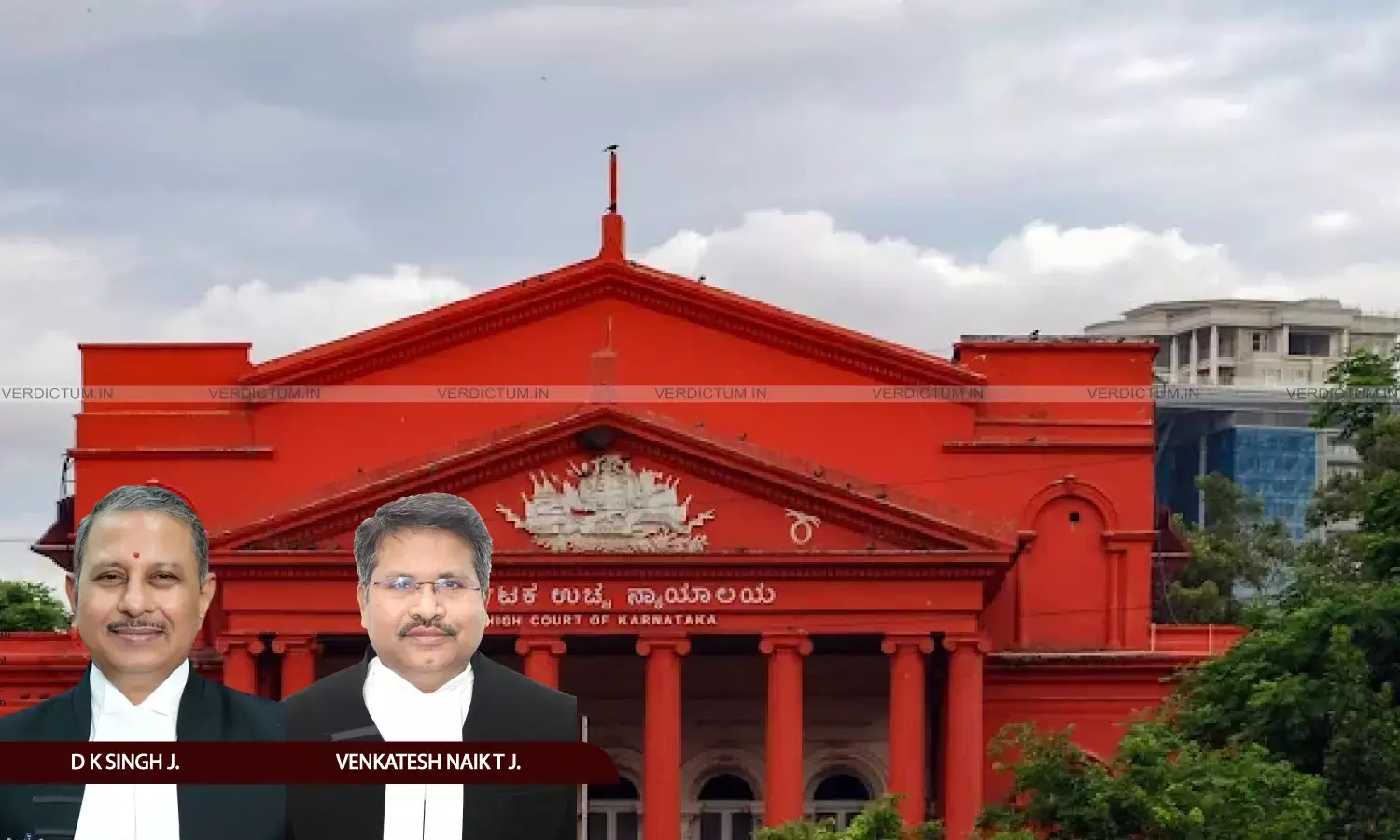Properties Mortgaged To Bank Not Proceeds Of Crime: Karnataka High Court Upholds Order Setting Aside Attachment Under PMLA
The High Court has held that when mortgaged properties are not prima facie derived from criminal proceeds, they cannot be subjected to attachment under the Prevention of Money Laundering Act, 2002 (PMLA).

Justice D K Singh, Justice Venkatesh Naik T, Karnataka High Court
The Karnataka High Court has ruled that assets mortgaged with a financial institution, when such assets are not acquired from criminal proceeds, cannot be attached by invoking the provisions of the Prevention of Money Laundering Act, 2002.
The High Court was hearing four connected appeals filed by the Directorate of Enforcement (ED) under Section 42 of the PMLA, challenging an order of the Appellate Tribunal (PMLA), New Delhi, which had set aside the Adjudicating Authority’s attachment of seven properties mortgaged to Syndicate Bank by a borrower and his family members.
A Division Bench comprising Justice D.K. Singh and Justice Venkatesh Naik T., while upholding the order, observed that “when prima facie the properties mortgaged to the Bank are not the proceeds of the crime, the attachment order passed by the Adjudicating Authority in respect of the seven properties mortgaged to the Bank for advancement of loans cannot be justified in law.”
The Directorate of Enforcement was represented by Advocate Madhukar M. Deshpande, while Advocates Bhargava D. Bhat and C. Vinay Swamy appeared for the respondents.
Background
The matter arose from a Central Bureau of Investigation (CBI) probe registered against Syndicate Bank officials and private borrowers, for offences under Sections 120B, 409, 420, 467, and 471 of the Indian Penal Code and Section 13(2) read with 13(1)(d) of the Prevention of Corruption Act, 1988.
The CBI alleged that certain bank officials had colluded with borrowers in sanctioning loans and overdraft facilities in violation of banking norms, resulting in a financial loss exceeding ₹12.63 crore to the Bank.
Following the CBI charge sheet, the Enforcement Directorate initiated attachment proceedings under the PMLA and provisionally attached seven properties belonging to the borrowers and their family members. These properties had been mortgaged to Syndicate Bank as collateral against loans and included residential plots, industrial units, and agricultural lands.
Notably, the Bank had already initiated recovery proceedings under the SARFAESI Act, 2002, issued possession notices, and taken control of some mortgaged assets before the ED’s attachment.
However, the Appellate Tribunal (PMLA) quashed the attachment order, observing that the mortgaged properties were not acquired from the proceeds of crime. Aggrieved, the ED appealed before the Karnataka High Court under Section 42 of the PMLA.
Court’s Observation
The Karnataka High Court noted that the Adjudicating Authority had failed to issue notice under Sections 8(1) and 8(2) of the PMLA, which require an opportunity of hearing to any person claiming a legitimate interest in the attached property, to Syndicate Bank, even though the properties in question were mortgaged to it.
While reiterating the principle that only assets representing the proceeds of crime are subject to attachment, the Court held that “the properties offered as collateral security against the loans could not be described as proceeds of crime as defined under Section 2(u) of the PMLA.”
The Bench further observed that the period of the alleged offence preceded June 1, 2009, when cheating and conspiracy were added to the PMLA Schedule. Since the mortgaged assets were acquired before the alleged offences, they could not qualify as tainted properties under the Act.
The Court emphasised that Syndicate Bank had advanced public money and was not itself part of the conspiracy, adding that “the Bank has been the victim of the crime committed by the Branch Manager and the Manager in conspiracy with the borrowers. By attaching these properties, the Bank would not be able to proceed against them to recover its loans, and that cannot be the object of the PMLA.”
The Bench further remarked that secured creditors like Syndicate Bank are entitled to enforce recovery under the SARFAESI Act, and blocking such proceedings would prejudice the institution and conflict with the statutory recovery mechanism.
Conclusion
Upholding the Appellate Tribunal’s decision, the High Court dismissed the Enforcement Directorate’s appeals, holding that the attachment was invalid in law.
Cause Title: Directorate of Enforcement v. Asadullah Khan & Another
Appearances
Appellant: Advocate Madhukar M. Deshpande
Respondents: Advocates Bhargava D. Bhat and C. Vinay Swamy


